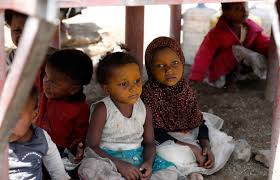New MidEast Policy Brief on Humanitarian Biometrics in Yemen


In our newest MidEast Policy Brief, "Piloting Humanitarian Biometrics in Yemen: Aid Transparency versus Violation of Privacy? " , Maria-Louise Clausen addresses the challenges of using biometrics for the World Food Program's aid distribution in Yemen. It highlights the need for balanced approaches that counter fraud and aid diversion of humanitarian operations, while also safeguarding the privacy of beneficiaries.
Humanitarian work is under pressure from donors to prove efficiency, cut costs, and strengthen accountability. To this end, biometric data – such as fingerprints or iris scans – is increasingly used to register and identify beneficiaries in food assistance, refugee identity management, and cash assistance. The World Food Program (WFP) is on the forefront of this development, but in Yemen, their roll-out of biometric registration has been met with resistance from the Houthi authorities in the north. The Houthis accuse the WFP of not being neutral and violating Yemeni law by wanting control over biometric data.
In response, the WFP has on several occasions scaled back its humanitarian assistance. The WFP maintains that biometric registration is necessary to prevent fraud and ensure effective aid distribution and emphasizes that beneficiary data is held in a secure system. Additionally, it is voluntary to have biometric information registered, but critics question whether the need for informed consent is meaningfully upheld when acceptance of biometric registration is a prerequisite for access to life-saving food and medical treatment.
The power struggle between the Houthis and the WFP shows how aid is politicized and weaponized. Civilian Yemenis are caught in the middle. The policy brief points out that the dilemmas related to efficient and transparent aid distribution are genuine, but that the introduction of biometrics can impose additional risks on the already most vulnerable. While biometric registration can prevent fraud and ensure effective aid distribution, more attention to the consequences of biometric registration for the beneficiaries is required.
The policy brief reflects findings from the project "Biometrics and the humanitarian intervention in Yemen", supported by the Norwegian Centre for Humanitarian Studies (NHCS) and the PRIO Middle East Centre.

Aden — Yemen Airways has announced new updates to its ticket cancellation (VOID) policy, introducing financial penalties on travel agents in…

Geneva – The United States announced that Yemen will not be among the countries benefiting from a new $2 billion funding pledge for United Na…

Paris — The French humanitarian organization Acted announced that it has delivered cash assistance to nearly 89,000 people affected by displa…